
To support pancreatic cancer research today, please contact Rhea Siu at 604.877.6157 or rhea.siu@bccancer.bc.ca.
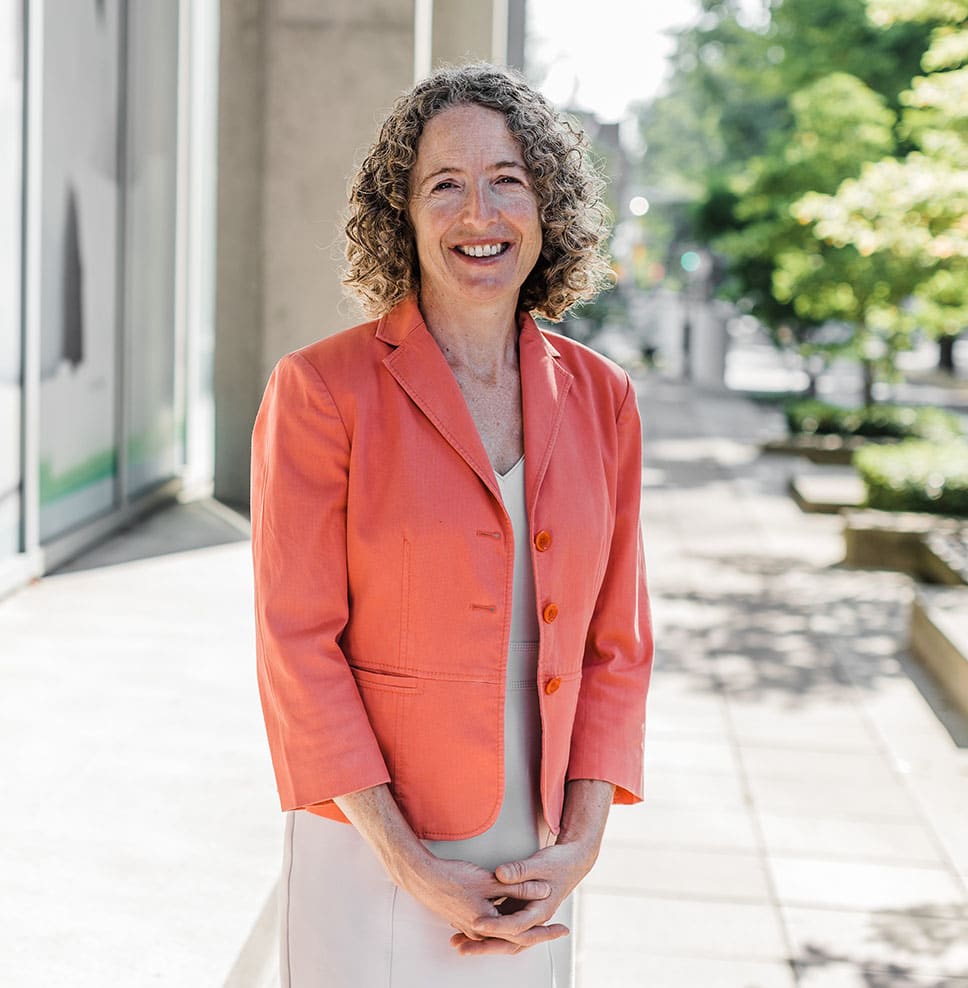
So many of you heard our rallying cry in September when we officially launched our Beyond Belief Campaign to raise $500 million to transform cancer care for all British Columbians. Your response, and the momentum it’s created as we collectively rise to support a cause that will affect us all, is inspiring.
A massive priority for Beyond Belief is innovative research in treatment and care. I see the impact philanthropy has on cancer innovation every day. Two new BC Cancer studies, that the Foundation is proud to support, have recently published game-changing results in the prestigious academic journal Nature.
Dr. Samuel Aparicio’s lab, already renowned for decoding the deadliest form of breast cancer (triple-negative subtype), has shed new light into how these treatment-resistant tumours evolve, providing invaluable information into both how the disease progresses and how a patient responds to therapy.
Another home-grown innovation breaking global ground is the simple blood test established by Drs. Kim Chi and Alex Wyatt that uses circulating tumour DNA (ctDNA) to uncover critical information about a prostate cancer patient’s disease, and how best to manage it.
Donor-funded research and advancements like these — and those emerging from the Pancreas Centre BC that the Hager family helped create over a decade ago, and continue to generously support today — are the backbone of B.C.’s leading cancer outcomes.
As the holidays approach, we’re all mindful of our ability to give — to the people we love, and to our community members who need it the most. When you invest in research today, it saves lives tomorrow. And that’s the best gift any us will ever give, or receive.
Sincerely,
Sarah Roth
President & CEO
BC Cancer Foundation
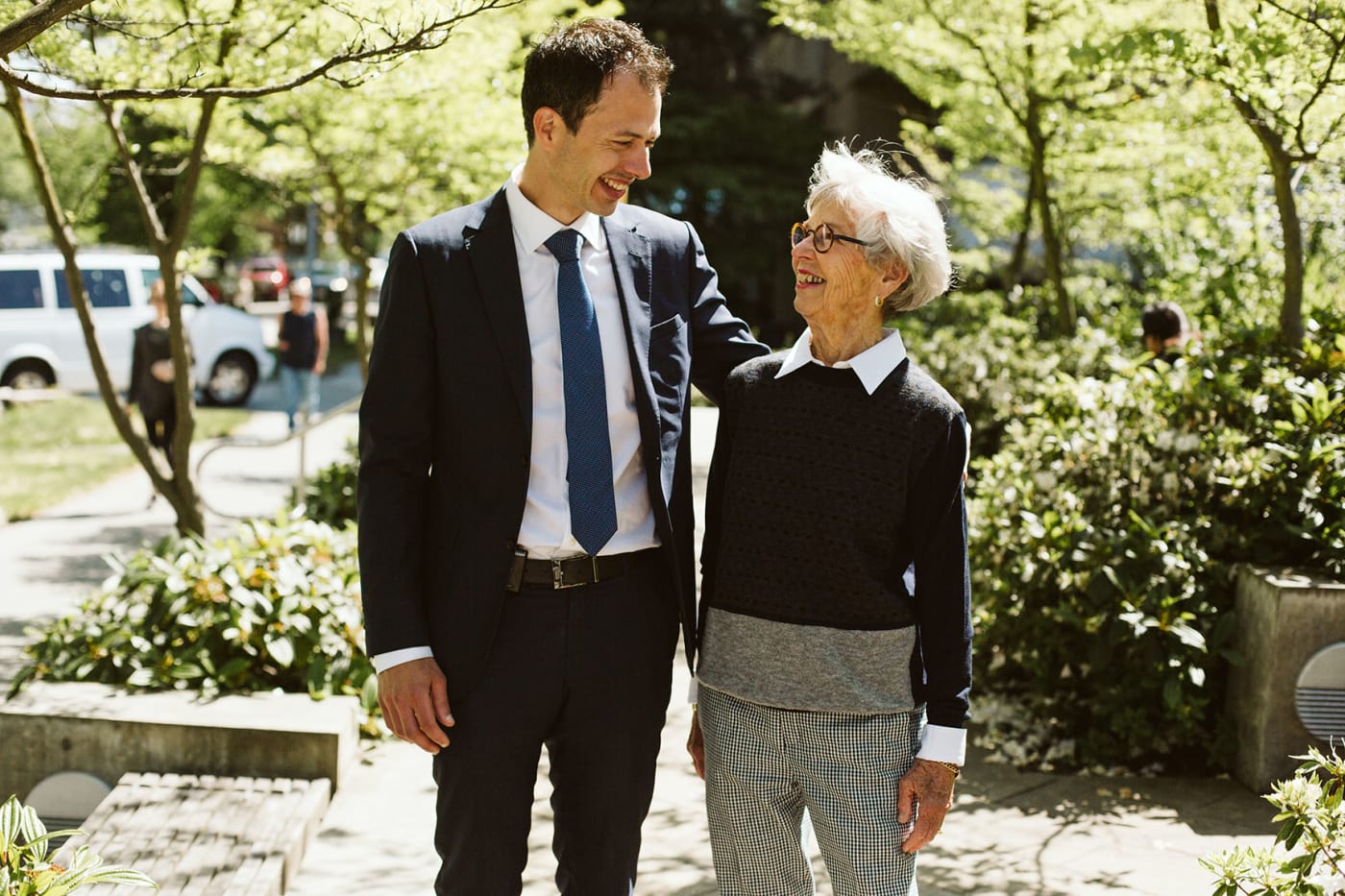
Bob Hager was barely out of the surgery that deemed his pancreatic cancer untreatable, when he pragmatically stated from his hospital bed, “I’m going to do something about this disease.”

“I don’t think we’ll ever meet a braver or more driven man,” says Judy Hager, his wife of 50 years. “In the four short months between his diagnosis and his death, Bob was determined to set up a pancreatic research and care initiative to help save others from the same hopeless outcome that he knew was his.”
Drawing on the same collaborative spirit he used in co-founding Phillips, Hager & North Investment Services as a young man, Bob recruited (and invested $1 million in) a team of experts from BC Cancer, UBC and Vancouver General Hospital.
Along with Bob’s trusted PH&N partners, they all gathered around the dining room table, recalls Judy, and formed a unique partnership to help identify gaps in pancreatic cancer care — and in 2012, less than a year after Bob passed away, the Pancreas Centre BC was launched.
In recognition of the centre’s 10-year anniversary, Judy and her daughters, Leslie Carter and Shelley Ferris, are building on what Bob so selflessly started. True to the ethos of his original gift, the Hager family is donating $5 million to further fuel the work at Pancreas Centre BC, to be split between BC Cancer Foundation and VGH & UBC Hospital Foundation and matched by both for a total of $10 million.
“It’s about my dad, about the initial donation he made 10 years ago, and continuing the hope that a difference can be made for earlier detection and better outcomes for other patients with pancreatic cancer,” says Leslie. “We have great confidence in the work being done by BC Cancer and VGH — this donation reiterates our conviction that by working together something can be done about this disease.”
“When the Hager family first gave to this cause there was only a small group of researchers focused on pancreatic cancer in B.C., says BC Cancer’s Dr. Daniel Renouf, founding co-director of Pancreas Centre BC along with VGH’s Dr. David Schaeffer. “Our initial goal was to become one of the national leaders in this field. We have now grown to be one of the international leading groups in pancreatic cancer research and care.”
“The Hager’s ongoing involvement, and passion to ensure that the program is growing and research is moving forward, is ultimately translating into better availability of treatment, testing and outcomes for patients,” says Dr. Renouf.
With a focus on tailoring treatment strategies, there’s been incredible advances in pancreatic cancer research over the last decade, he says. “We used to think of pancreatic cancer as one disease, but now we know there are multiple important and distinct subtypes, each with its own potential actionable treatment pathway.”
After it was discovered that one of the subtypes was related to a breast cancer gene mutation (BRCA), which is inherited and associated with other cancers such as breast, ovarian and prostate, the Hagers instigated a hereditary testing program for all pancreatic cancer patients, not just those with a family history. It proved so invaluable that it became the first government-funded program of its kind in Canada.
“This latest investment is extremely generous, and will allow us to take things to the next level,” says Dr. Renouf. It will enable the centre to recruit a world-class team to drive further innovation, expand on the hereditary testing program and work towards creating province-wide access to the Rapid Access Clinic — a groundbreaking program Dr. Renouf’s team created to help reduce the time between diagnosis and treatment for pancreatic cancer patients, which is acting as the model for other cancer programs in B.C.
Bob’s youngest daughter, Shelley, can’t imagine a future in which her family doesn’t support BC Cancer.
“If I could choose my family’s path, it would certainly be a route as far away as possible from a disease like pancreatic cancer,” she says. ”But we don’t get to choose. Better to do a really amazing job of the hand you are dealt, than to not play at all.”
To support pancreatic cancer research today, please contact Rhea Siu at 604.877.6157 or rhea.siu@bccancer.bc.ca.
“BC Cancer is a place where we can turn our ideas into reality, where good ideas and good people can flourish.” - Dr. Chi
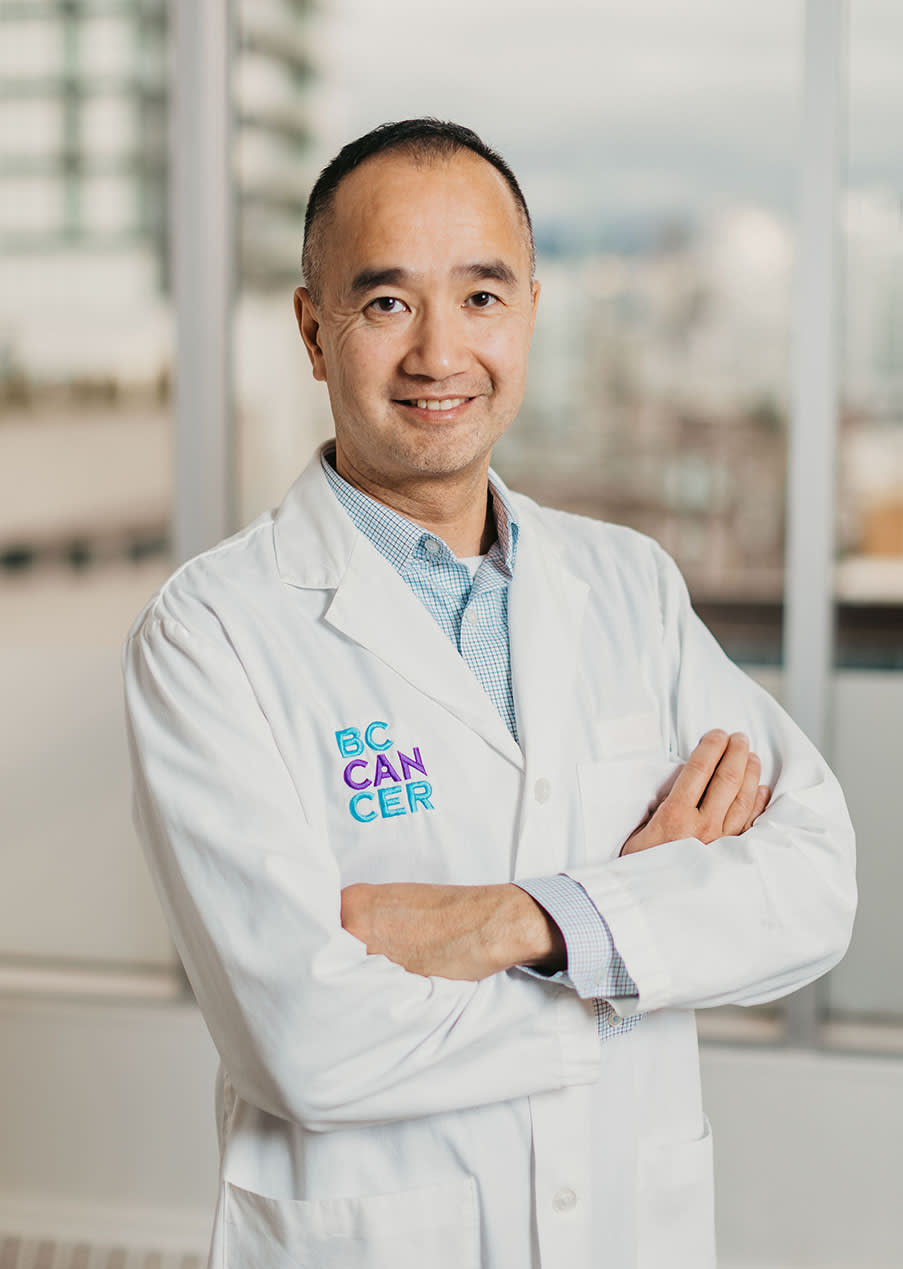
Scratch just beneath the surface of almost every major drug or treatment used in advanced prostate cancer today and you’ll find the work of Dr. Kim Nguyen Chi.
An internationally renowned leader in prostate cancer research, Dr. Chi’s contributions to groundbreaking clinical trials have had global impact. He’s led studies that have included more than 1,000 patients from 23 countries at 260 cancer centres around the world. And yet, for the entirety of his career — from his medical oncology residency training in the mid-90s to his appointment as BC Cancer’s vice president and chief medical officer in 2019 — his feet have remained firmly planted in Vancouver.
While he’s had job offers from the U.S. and even further afield, the research programs and teams he’s established in his more than 20 years at BC Cancer, which are well connected to other collaborators provincially, nationally and internationally, have kept him close to home, he says.
“Professionally, I’ve never wanted for opportunity. BC Cancer is a place where we can turn our ideas into reality, where good ideas and good people can flourish.” And Dr. Chi is definitely one of the good ones.
Early in his career, unsatisfied with the limited options available to patients with advanced prostate cancer, he started a genitourinary (cancers found in the urinary and male reproductive system) clinical trials program. “It provided an opportunity for patients to access new treatments with promising activity years before they were available as standard of care,” he says.
The list of highly effective drugs the program has helped bring to fruition includes docetaxel, abiraterone acetate, enzalutamide, apalutamide, olaparib, and 177-lutetium-PSMA-617 to name just a few. But not every clinical trial he touches turns to gold, of course. “There have been also some studies along the way where we don’t see the benefits that we hoped for,” he says, “but that’s the nature of research.”
Community support for this experimental work is one of the biggest factors that has kept him in Vancouver, he says. “Without the BC Cancer Foundation and its donors, we would not have been able to do all that we have done. Philanthropic investment allows us to explore new ideas, and helps generate the initial data that we can use to seek more funding from research granting agencies.”
Recently this support includes a Foundation-funded study he co-led with Dr. Alexander Wyatt. Published in the prestigious scientific journal Nature, it involves a first-of-its-kind blood test that uses deep whole genome sequencing to analyze metastatic cancers shed into the bloodstream. Known as circulating tumour DNA (ctDNA) these biomarkers reveal characteristics unique to each patient’s cancer, and provide new tools to develop more personalized, effective and less-toxic treatment plans.
This latest innovation is a crowning achievement in a career that has seen remarkable gains in prostate cancer care. Two decades ago, the first line of defense for metastatic prostate cancer was hormone therapy, and the average survival rate for most patients was three years, says Dr. Chi.
“With new diagnostics (liquid biopsies, genomic testing and Prostate-Specific Membrane Antigen (PSMA)-PET scans, which detect cancer spread earlier and more precisely) we now have a better understanding of an individual’s cancer from a prognostic and treatment perspective. And patients can expect an average survival that is doubled compared to what it was before.”
While Dr. Chi is incredibly proud of BC Cancer-led advancements in prostate cancer care, he’s quick to point out that “every gain is notable, even if I have not had a direct or even indirect role in it. From my perspective as a researcher and a clinician, success anywhere in the world is a success for us all because we are driven by the same thing — to improve the lives of people with cancer.”
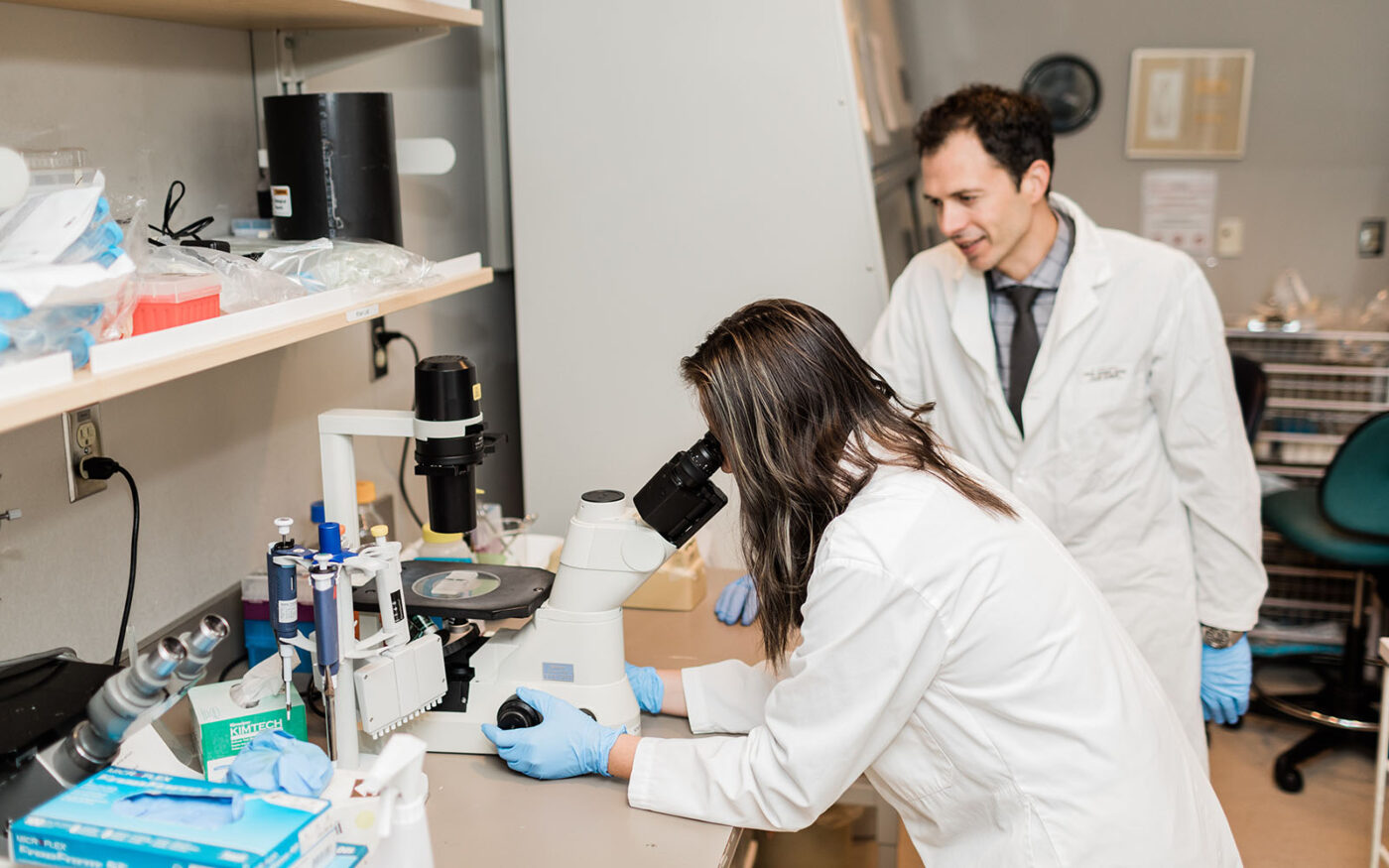
Dr. Daniel Renouf, BC Cancer
When donor support helped establish the Deeley Research Lab in Victoria in 2003, it was the first lab in the country designed to manufacture CAR-T cells, and it put BC cancer at the center of Canadian immunotherapy research.
Now, thanks to a $2 million donation from BMO Financial Group, BC Cancer is poised to become a leader in the next generation of immunotherapy through the creation of a dedicated Immunotherapy Clinical Trials Research Core in Vancouver.
“There’s a direct line between innovation and technology and improving the quality of our lives. This new, dedicated research hub at BC Cancer enables the further prioritization of immunotherapy technology in a way that will directly and positively impact the lives of patients here in B.C.,” says Gary Whitfield, Regional President, B.C. Region, BMO Private Wealth.
BMO has been a supporter of the BC Cancer Foundation for nearly three decades. In 2019, they matched donations up to $500,000 to help bring a PET/CT scanner to Victoria — a machine that now fields over 2,000 scans a year.
“Over the last 20 years, immunotherapy has gone from playing a very minimal role in cancer treatment, and being really in the research realm, to being one of the most important tools we have to treat cancer,” says Dr. Daniel Renouf, Medical Lead of BC Cancer — Vancouver and Co-Director of Pancreas Centre BC.
It was the discovery of immune checkpoint inhibitors — a class of therapy that activates the immune system to recognize and attack cancer cells — that brought immunotherapy from the lab to the patient. Starting with melanoma, treatments based on these advancements showed unprecedented outcomes for a number of cancers.
“It’s really revolutionized cancer care,” says Dr. Renouf. “The main treatment for many cancers now is either entirely immune based or combines immunotherapy with chemotherapy or other drugs.”
Dr. Renouf emphasizes that immunotherapy is the number one priority in cancer research right now. By inducing an immune response, it’s been shown that even certain advanced cancers can be cured or controlled for a number of years with minimal lasting side effects.
However, there are certain cancer types that do not respond to existing immune treatments, and some tumors can become resistant to immunotherapy treatments over time.
Researchers in next generation immunotherapy are working to overcome these challenges: transforming ‘immune cold’ cancers to ‘immune hot’ and finding new ways to activate a patient’s immune system to fight resistant cancers.
With these development efforts comes the need for resources and infrastructure that is beyond the current standard of care in immunotherapy.
“Some of the new classes of immune therapy drugs have more toxic side effects associated with them. They need to be tested and given in a monitored environment, with a lot of expertise to manage these side effects,” explains Dr. Renouf.
This requires in-patient care, training and experience in administering treatment, and the resources to track side effects — and ultimately treat them. Without dedicated space, the capacity to conduct clinical trials and deliver next-generation treatments was limited. BMO’s support is helping to change all that.
“This gift is supporting our ability to strengthen our clinical trials network, and the new clinic is going to be transformational for us to build-up our program of next generation immunotherapies,” says Dr. Renouf.
“We are very proud of our ongoing support for BC Cancer. It’s just one way we continue to serve the communities in which we live and work, putting our core purpose as an organization into action,” says Whitfield.
These leading-edge innovations are the future of cancer care, and donor support is making these discoveries possible right here in B.C.
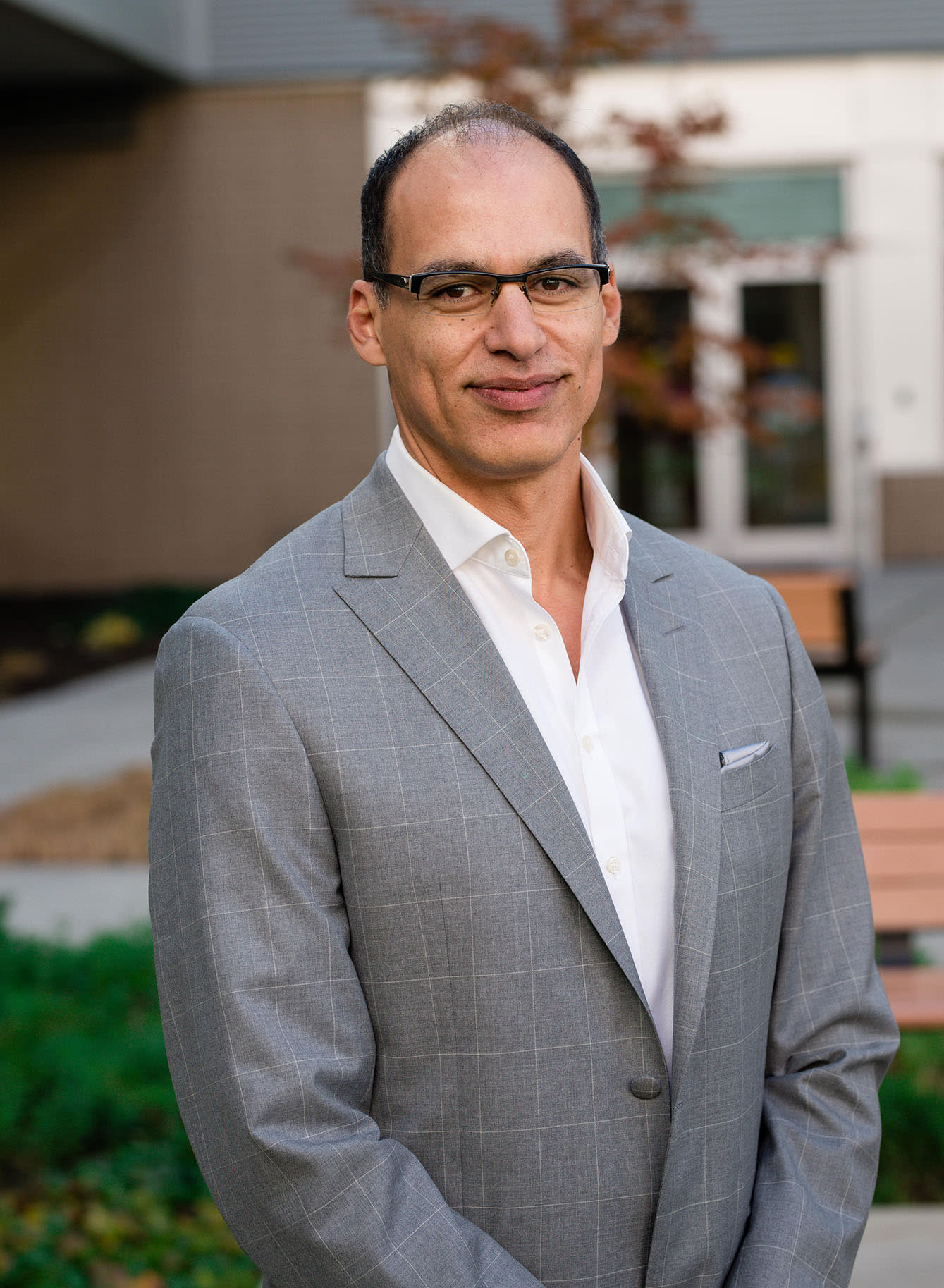
Dr. Islam Mohamed
Internationally renowned for its award-winning wineries, the Okanagan might not immediately come to mind in regards to cancer research that’s breaking global ground. But BC Cancer – Kelowna’s Dr. Islam Mohamed, who presented his first-of-its-kind clinical trial at the World Conference on Lung Cancer in Austria this past summer, wants the interior to be known not just for great grapes, but great research as well.
His trial, to be conducted in early-stage, non-small cell lung cancer, supported by a BC Cancer Foundation-funded fellowship, is officially known as “ctDNA Directed Consolidation Durvalumab After Induction and Concurrent Durvalumabwith SABR for Stage I NSCLC.” But as principal investigator, even Dr. Mohamed recognizes that’s a mouthful.
Simply put, he says, it’s the combination of two highly effective therapies — Stereotactic Ablative Radiotherapy (SABR) which delivers high doses of radiation to the tumour while sparing surrounding healthy tissues, followed by immunotherapy.
“It’s like producing a vaccine right where the tumour is. What happens is the radiation produces significant tumour cell kill and the tumour cells dump out the proteins that are inside the cells and that can prime the immune system to attack cancer in other locations as well,” he says.
While radiotherapy and immunotherapy are already being used to treat Stage 3 and 4 disease, “I came up with this concept because I wanted to see whether we could incorporate immunotherapy with SABR in early-stage disease as well.”
The innovative aspect, and what sets it apart from other studies, is that it’s bio-marker directed, he says. It’s the only trial in the world right now using circulating tumour DNA (detected via a blood test) to guide the duration of immunotherapy when used with SABR for early-stage lung cancer.
Almost 100 patients will be enrolled in the four-year study which launches next year at four BC Cancer centres with Kelowna at the epicentre.
All will receive SABR followed by immunotherapy, but for a shorter period than is typical in other studies, which treat for up to two years.
“To me, that seems like overkill for early-stage patients — 70 to 80% of those patients are not going to benefit from having that much immunotherapy. In our study everybody gets the immunotherapy but only four cycles (three months), and then we use circulating tumour DNA to rationalize who will receive extended immunotherapy treatment.”
One of the ways he hopes his study’s learnings will have global reach is through a research fellowship, made possible thanks to $360,000 in Foundation support. “It’s a win-win. We get more help to operate the study. The fellow gets expertise they can take to their respective centre, to introduce these novel treatments. And we can advance the state of the art in the field.”
A leader in the Kelowna community, AJ Gill was happy to help fuel the work being done in his own back yard. “Supporting Dr. Mohamed’s research was a way for us to honor my mother Harbhajan Gill, who had a short battle with cancer. BC Cancer and Dr. Mohamed were there to support us during this challenging time for our family. I am hopeful Dr. Mohamed’s work will provide life-saving treatment options for patients facing a lung cancer diagnosis, and our family is incredibly honored to support this world-first research and innovation happening right here in Kelowna.”
Donor support is crucial to clinical studies, says Dr. Mohamed. “It’s really the enabling factor that allows us to deliver this type of innovative care. It’s one thing to have an idea for how to do things differently, but unless you can attract funding, that idea kind of withers.”
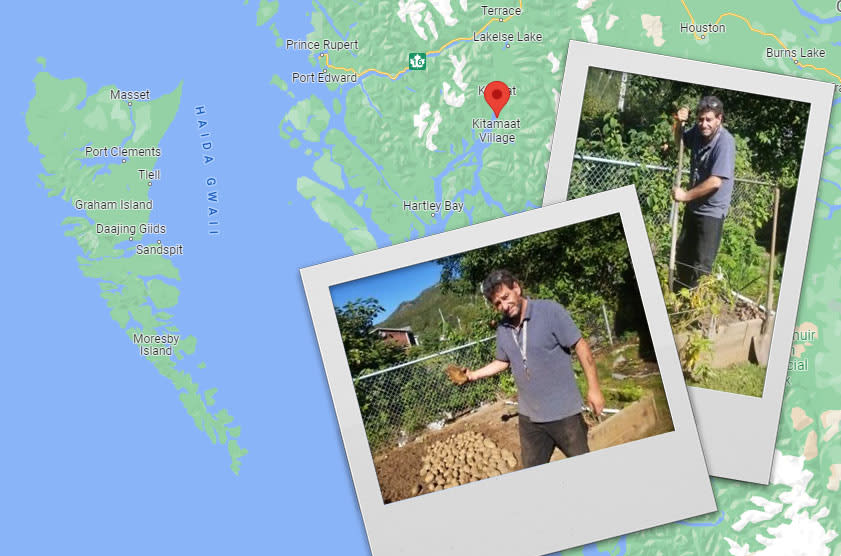
Cicilio Calado, 59, is no stranger to the physical demands of traditional cancer therapies. “I’ve done chemo, and I’ve done liquid radiation,” he says of his past treatments for both colon and thyroid cancer. “It’s very hard.”
But when it comes to the Precision Radiation Treatment (PRT) he received in 2022 as part of an innovative clinical trial at BC Cancer — Prince George, he smiles. “That was a breeze.”
In August 2021, Cicilio was planting potatoes at his parents’ home in Kitamaat Village on B.C.’s North Coast when he felt a pain in his rib. “Oh no, not again,” was his first thought as he remembered his past experience.
Instead of chemotherapy however, his family doctor referred him for PRT with Dr. Robert Olson, BC Cancer’s Provincial Lead of Radiotherapy, who placed Cicilio in the BC Cancer SABRCOMET- 3 PRT clinical trial, where precise, high-dose radiotherapy is used to target tumours.
Ciclio received treatment for five days at BC Cancer — Prince George, and this time, his experience was different. “There is no burning, no pain, nothing. 15 minutes later, it’s over.”
“The hardest part,” his wife Joanne jokes, “was after 15 – 20 minutes of treatment, what do you do for the rest of the day?”
Not surprisingly, Cicilio quickly returned to work at his job as a fulltime groundskeeper and janitor, “My energy was good.”
In July, 2022, Dr. Olson followed up with the Calados to discuss the results. “For now, there is no evidence of any disease,” said Dr. Olson. “Time will tell if Cicilio is entirely cured, but the cancer is completely controlled.” Now, Cicilio only has to drive 15 minutes to his local clinic for his three-month check-ups to monitor his progress.
Thanks to the donor-supported PRT trials in Prince George, the Calados have a new hope and perspective. “If you get up in the morning and your foot hits the floor, it’s a good thing,” Joanne says with a chuckle. “With the word cancer, you get so scared. That C word. Remember it’s just a word.”

Robert McLean, member of the BC Cancer Foundation’s Trusted Advisor Circle
Vancouver-based investment professional, Robert McLean, has been working with philanthropists for over a decade, helping countless families and businesses make the most out of every donation. Most recently, he joined as an inaugural member of the BC Cancer Foundation’s Trusted Advisor Circle, strengthening the Foundation’s philanthropic relationships in the broader financial community.
Robert answers three questions to illustrate why the donating securities (e.g., stocks, bonds and mutual funds) should be top of mind for investors:
Why donate securities?
Since the CRA doesn’t charge a capital gains tax on securities donated to a registered charity, a donor can benefit from significant tax savings by doing so. As a result, one can make a larger donation for the same cost, or save the extra money yet still make the same donation.
Many investors are reluctant to sell investments that have appreciated over time for fear of the tax hit. By donating them instead, you could minimize capital gains, while simultaneously getting a tax receipt for the appreciated value.
When should I donate securities?
If the goal is to offset capital gains, make sure you are donating securities that have increased in value since their purchase. You can also include securities in your estate planning as an invaluable tool to offset tax liability.
How do I donate gifts of securities?
Using the BC Cancer Foundation’s Securities Transfer Form, your investment provider will be able to transfer the securities seamlessly.
For more information, visit the Foundation’s website, call 1.888.906.2873 or email legacy@bccancer.bc.ca.


Dr. Thomas Madden, President and CEO of Acuitas Therapeutics
Scientific innovation moves at the speed of resources and support. This is something that Dr. Thomas Madden, President and CEO of Acuitas Therapeutics, knows all too well.
Having been engaged in innovative research and discovery for nearly four decades — and having cofounded Acuitas Therapeutics alongside Drs. Pieter Cullis and Michael Hope almost 14 years ago — his work is a testament to the effort, time and investment that life-saving scientific innovation requires.
Never has that been more evident than over the past three years. “The world demanded a quick response from the scientific community,” says Dr. Madden. “We needed to step up in a substantially shorter time frame than usual to help in the development of a safe and effective vaccine to fight COVID-19 — and with our lipid nanoparticle which enabled the Pfizer/BioNTech mRNA vaccine COMIRNATY®, we did.”
The pandemic showed us what can happen when all of our scientific ingenuity and creativity are empowered to work together to meet an international challenge. And, as is so often the case in science, advancements from one sector are leading to innovations in another.
“The vast amounts of data we collected from this work has already created partnerships and programs that are focused on how we can use this technology to treat cancer,” says Dr. Madden.
This was what compelled Dr. Madden and the Acuitas team to donate $300,000 to be split evenly between BC Cancer’s Precision Medicine for Breast Cancer Research (B-Precise) and Ovarian Cancer Research (OVCARE) programs. For them it’s more than a gift, it’s an investment for us all.
“Investing in cancer research right now is crucial,” says Dr. Madden. “We have an opportunity to turn some of B.C.’s best minds to developing new, effective therapies. Supporting these scientists will only help accelerate progress in precision cancer vaccines that are tailored to each individual patient. The work being done by the B-Precise and OVCARE teams is vital to this development.”
These teams include scientists like Dr. Sam Aparicio who leads a B-Precise team that has made major breakthroughs in the last decade in the treatment and global understanding of breast cancer; and Dr. David Huntsman, the director of an OVCARE team that has become an award-winning, internationally recognized research leader in ovarian cancer.
They also include Dr. Yvette Drew, a principal investigator who recently joined the OVCARE team as drug development lead. Her research and clinical excellence was key to the development of the most exciting new drugs for treating ovarian cancer, known as “PARP inhibitors.” Working across multiple research labs, she has seen firsthand what supporting early-phase clinical trials and translational research can accomplish.
“This donation enables our group to dive deeper,” says Dr. Drew, “exploring which treatment might work best for which patient and bringing our lab discoveries into the clinic through patient-focused clinical trials. It’s fantastic to be working on this as part of the great Team Science that is OVCARE.”
For Dr. Madden, it comes back to the word invest. Not for profit, but for impact. If the team at Acuitas hadn’t had the resources to spend more than a decade exploring nucleic acid therapeutics like mRNA vaccines, and establishing their position as a global leader in LNP development, they wouldn’t have been able to respond so quickly during the pandemic. And the potential we now see for this technology in cancer treatment might still be years away.
“That’s a more than worthwhile investment,” he says. And it’s an investment that he and Acuitas are glad to pay forward. “We’re in a fortunate position to contribute to the great work being done at BC Cancer.”
Innovative research takes time — it doesn’t happen overnight. But it saves lives. And thanks to donations like these, it’s happening just a little bit faster.